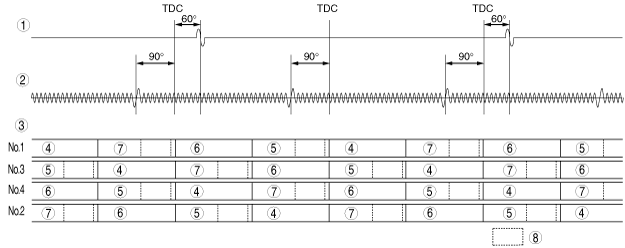 |
b3e0140t015
ELECTRONIC SPARK ADVANCE OPERATION[LF, L3]
id0140a9175000
Ignition method
|
Ignition method |
Ignition timing |
Ignition coil energization period |
|---|---|---|
|
Fixed ignition
|
Fixed at BTDC 10°
|
Fixed period at BTDC 10° to end of energization
|
|
Cycle estimated ignition
|
Ignition at timing appropriate to engine operation conditions based on input signals
|
• Energization time (ignition coil energization time) to igniter is determined according to battery voltage
• Cylinder independent ignition
|
Timing chart
b3e0140t015
|
|
1
|
CMP sensor input
|
|
2
|
CKP sensor input
|
|
3
|
Cylinder number
|
|
4
|
Intake air
|
|
5
|
Exhaust air
|
|
6
|
Expansion
|
|
7
|
Compression
|
|
8
|
Ignition coil energization allowance period
|
Determination of Ignition Timing
b3e0140t016
|
|
1
|
Throttle valve position
|
|
2
|
Engine speed
|
|
3
|
Start zone
|
|
4
|
Regular zone
|
|
5
|
Idle zone
|
|
6
|
Open
|
|
7
|
Closed
|
|
8
|
Low
|
|
9
|
High
|
|
Control zone |
Control condition |
Ignition method |
|---|---|---|
|
Start zone
|
Engine speed is 500 rpm or less.
When mass airflow sensor is damaged.
|
Fixed ignition
|
|
Idle zone
|
Fully-closed throttle valve when engine speed is the target idle speed +2,250 rpm or less
|
Determines ignition timing adding each correction to the idle spark advance
|
|
Cycle estimated zone
|
Engine operation except start zone and idle zone
|
Determines ignition timing adding each correction to the basic spark advance
|
Ignition timing calculation method table
|
Contents
|
Calculation method or determination method for ignition timing, advance value and correction
|
Control zone
|
|||
 |
 |
 |
|||
|
Fixed ignition
|
Fixed at BTDC approx. 10° CA
|
A
|
|
|
|
|
Cycle estimated ignition
|
Idle spark advance
|
Set value according to target speed and charging efficiency*
|
|
A
|
|
|
Basic spark advance
|
Set value according to engine speed and charging efficiency*
|
|
|
A
|
|
|
Correction
|
Engine coolant temperature advance correction
|
Purpose: Ensures combustion stability when engine coolant temperature is low
Except during idling
• High charging efficiency*, low engine coolant temperature→large correction
|
|
B
|
B
|
|
Warm-up promotion spark retard correction
|
Purpose: Activates the catalytic converter earlier
Approx. 50 s after engine start
• According to engine coolant temperature→correction
|
|
B
|
|
|
|
Feedback correction
|
Purpose: Ensures idling stability
During idling (inhibited during test mode)
• Large difference between actual engine speed and target engine speed→large correction
• Small difference between actual engine speed and target engine speed→small correction
|
|
B
|
|
|
|
EGR correction
|
Purpose: Prevents deviation of required ignition timing during EGR gas feed
When EGR valve position is the specified value or more except during EGR valve initialization
• According to engine speed and charging efficiency*→correction
|
|
|
B
|
|
|
Shift spark retard correction
(ATX)
|
Purpose: Reduces shift shock during shifting
Determined according to torque reduction request signal from the ATX control
• Large torque down request during shifting→large correction
|
|
|
B
|
|
|
Deceleration fuel cut recovery retard correction
|
Purpose: Reduces shock after recovery from deceleration fuel cut and during re-acceleration while in deceleration fuel cut
Re-acceleration after recovery from deceleration fuel cut and while in deceleration fuel cut
• Low engine coolant temperature→large correction
|
|
B
|
B
|
|
|
Acceleration spark retard correction
|
Purpose: Prevents knocking and shock during sudden acceleration
Acceleration when charging efficiency
*
volume increase (acceleration amount) is specified value or more
• High acceleration amount→high retard
|
|
|
B
|
|
|
Standing start spark retard correction
|
Purpose: Prevents shock when vehicle accelerates from a standing start
When vehicle accelerates from a standing start
• According to engine speed, throttle valve opening angle, engine coolant temperature and intake air temperature→correction
|
|
|
B
|
|
|
Knocking spark retard correction
|
Purpose: Knocking suppression
When knocking is detected while driving under high load
• Large amount of knocking→large correction
|
|
|
B
|
|
Ignition inhibition condition